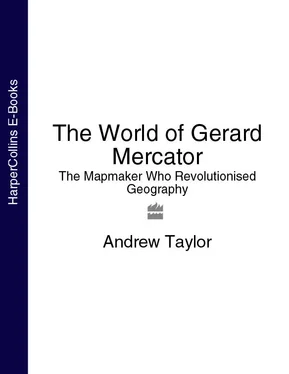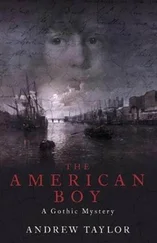1 ...8 9 10 12 13 14 ...18 Gerard, like his brothers, received his education on the hard wooden benches of the local village school. The few hundred houses in Rupelmonde were huddled around the church, a short way from the river and the imposing black fort that glowered down upon it. Nearby was the ancient water mill where grain was brought from the surrounding fields, its great rough limestone grinders making the wooden structure groan and vibrate as they turned under the power of the rising and falling tides. Farmers brought their produce to a regular market on the riverbank, while barges would tie up to sell cheeses from Brussels, or herring, imported cloth, and ironware from the wharves of Antwerp. Bigger, seagoing ships often moored at the wharves, pausing on their journeys upriver to Brussels. Outside the village, the landscape stretched away for miles, flat and open.
Rupelmonde
British Library, London, Rare Books and Maps Collections
With its fields, mill, market, school, and church, the little town provided for every aspect of life, but the fort, with its high stone walls and seventeen towers, overshadowed everything. Built by Norman invaders in the eleventh century to overawe and terrify the local people, it was no mere monument to past brutality. Behind its bleak walls there still languished criminals, dissidents, traitors, and forgotten men.
The young Gerard was apparently drawn to the sheer variety the landscape offered, for he developed a love of nature that would stay with him throughout his life. From his earliest days, at least according to the stories that grew up around him later, the schoolmaster had little need to encourage his pupil to greater effort in the classroom. Much of the work in the single schoolroom was learning by rote, the children chanting the Latin of the Lord’s Prayer or the Creed, or the questions and answers of the catechism. Every lesson, every moral precept, was based upon the Bible. At home, there was neither leisure nor privacy in the crowded and hardworking household, but the young boy usually managed to find a place to hide away with his books. Often, he would be huddled with them long into the night, forgetting to eat or sleep, and his potential was clearly recognized by his uncle.
In 1526, Hubert de Cremer died suddenly, and the family was threatened with disaster once again. (There is no record of what killed him.) Emerance was able to survive on the little money he had saved, and five of their children were almost old enough to look after themselves. However, Gerard was just fourteen, and if he had had to work in order to earn his keep, his family’s hopes for his future would have been dashed. An apprenticeship could have led only to a life of unremitting toil like his father’s; there would have been no time for learning.
Once again, they had to rely on Gisbert. Three masses a week at the hospice brought him a regular income of some forty-three pounds a year – enough for him to have acquired two small farms as well as his own house, and enough, if he chose, to provide for the education of his great-nephew. The young boy was taken from his family and went to live with his great-uncle, who became not only his benefactor but also his adoptive father and his tutor. Yet if Gerard, like his two elder brothers, were to follow Gisbert into the Church, he would need more than a smattering of Latin grammar picked up at home and on the benches of Rupelmonde’s school. The boy would have to be educated.
Chapter Four Among the Brethren of the Common Life
THE ARTIST ALBRECHT DüRER, journeying through the Netherlands from his native Germany, described ’s Hertogenbosch, stranded on the windswept and unwelcoming plains some seventy-five miles northeast of Antwerp, as “a fair city, with an extremely beautiful church and a strong fortress. …” 1The Gothic ramparts of the Cathedral of St. Jan might have impressed a traveler, but the town itself was a bleak and forbidding place, a long way from the riverside idyll of Rupelmonde. Here, fifteen thousand people lived behind high stone walls, which would surround the young Gerard for the next three years.
The town’s name means “woods of the duke,” and the harsh guttural of the Flemish pronunciation reveals its sixteenth-century soul. It was already one of the oldest towns in the Low Countries when Gerard arrived – no balmy country retreat, but a fortress set up by Duke Henry I of Brabant more than three centuries earlier to protect the remote northern borders of his dukedom. The grim stone walls could keep out foreign enemies, but inside them, ’s Hertogenbosch seethed with religious and political discontent that occasionally erupted in violence, as occurred in many Netherlands towns. ’s Hertogenbosch, the Netherlands, and most of Europe were in ferment. The trouble had been building for decades.
Ten years earlier, when Gerard was still a young boy, stories had begun filtering back from Germany of a young priest who had issued a direct challenge to the Catholic Church on the need for reform and an end to corruption. In nailing his list of ninety-five theses to the church door in Wittenburg, Martin Luther had ignited the first flames of a conflagration that would engulf much of Europe.
Martin Luther
Science Photo Library, London
Only God, he declared, and not papal authority, could forgive sin; the selling of indulgences by which divine forgiveness could supposedly be guaranteed in return for the payment of cash was a corrupt and cruel deception. Luther called for reform rather than revolution. “If the Pope knew the exactions of the pardon-preachers, he would rather that St. Peter’s church should go to ashes, than that it should be built up with the skin, flesh and bones of his sheep,” he declared in one of his theses. Yet the whole of Christendom, not just the Catholic Church, threatened to go to ashes: Political dissatisfaction and growing national feeling in the Netherlands, Germany, and much of northern Europe had prepared the ground for a conflict that would tear the continent apart, leaving it split irrevocably between Catholics and Protestants.
Johannes Gutenberg’s first presses produced massive runs of printed papal indulgences, but they also turned out seemingly unlimited editions of non-Latin Bibles on which the faithful could rely. Alongside them were other religious texts, mystical books, and lives of the saints, many of them written in the day-to-day language of the people, breaking forever the Catholic Church’s monopoly on Holy Writ. The anxieties of kings, emperors, and the Church itself could do nothing to hold back the rapid spread of movable type.
Printed tracts showered from the new presses like sparks, lighting a thousand fires of heresy – fires that were fed among the German princes and nationalists in the Low Countries by resentment of the emperor’s power. There was already bitterness over the harsh taxes with which Charles tried to claw back the massive debts he had incurred. Despite the treasure that was starting to flow into his coffers from the New World, he relied largely on the merchants of the Netherlands to finance his wars: For every hundred florins in gold and silver that fell into Charles’s lap from the New World, four hundred were squeezed from the taxpayers of the Netherlands. The Venetian ambassador Antonio Soriano described the Low Countries as “the treasures of the King of Spain, his mines, his Indies which have sustained all the Emperor’s enterprises.” Others, more crudely, saw them as a cow to be milked to exhaustion.
The merchants’ pockets were not bottomless, though, and their goodwill was easily exhausted. Every new demand for tax was met by angry resistance, which often mingled with religious dissent and spilled over into fighting on the streets of towns in the Netherlands.
Читать дальше












